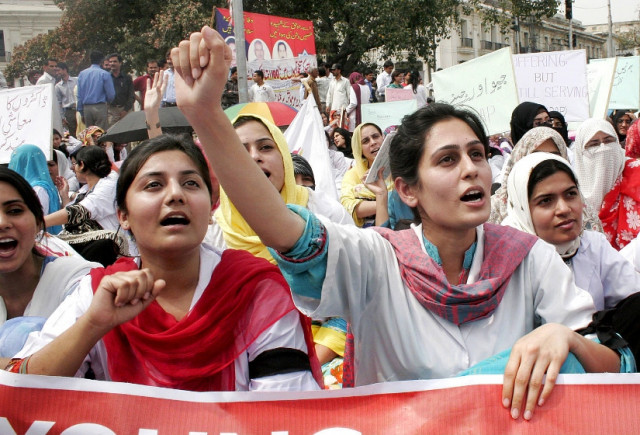Healthcare alert: Junior doctors shut OPDs once again
Thousands of patients left in the lurch in Lahore, Faisalabad and Rawalpindi

Healthcare alert: Junior doctors shut OPDs once again
On the call of the disgruntled Young Doctors Association (YDA), medical practitioners once again took to the streets in different cities to record their protest against the new policy.
YDA representatives kept the OPDs of all public hospitals, expect the Mayo Hospital, closed on weekend and refused essential healthcare services to the ailing patients.
Speaking to The Express Tribune, a middle-aged patient with severe skin allergy said he took leave from his office to get a medical check-up done but the doctors were on strike and were refusing basic services.
Muhammad Ramzan said the government was paying salaries to these ‘messiahs’ from the taxpayers’ money and they were going on strikes.
“All their perks and privileges are funded through public money but they are refusing essential services to the ailing patients,” he lamented. “Frequent shutdowns at public hospitals have exposed the rulers’ claims of good governance.”
YDA Punjab President Dr Maroof Venice said the government had accepted some proposals of the association but did not agree on scraping the central induction policy.
“The association will expand its agitation scope if the government does not accept its demands,” he said, pointing out that government teaching hospitals were producing nearly 4,000 doctors a year but hardly 500 would get admission to any specialisation due to the new induction policy.
He believed the policy would ruin the medical profession in Pakistan.
A spokesman for the Punjab Health Department advised the YDA to negotiate with the authorities in a civilised manner. “The new policy has been designed to increase transparency and efficiency in the medical profession,” he said. “The new policy will help in addressing the shortage of doctors in different areas, including anaesthesia, neurology and heart surgery.”
He pointed out the central induction policy was being implemented through professors of different medical universities and there was no chance of political influence over them.
The new central induction policy is aimed at ensuring merit in recruitment of medical practitioners. The government has constituted a committee comprising senior medical professionals to implement the new policy as nepotism is rampant.
Published in The Express Tribune, December 11th, 2016.



















COMMENTS
Comments are moderated and generally will be posted if they are on-topic and not abusive.
For more information, please see our Comments FAQ